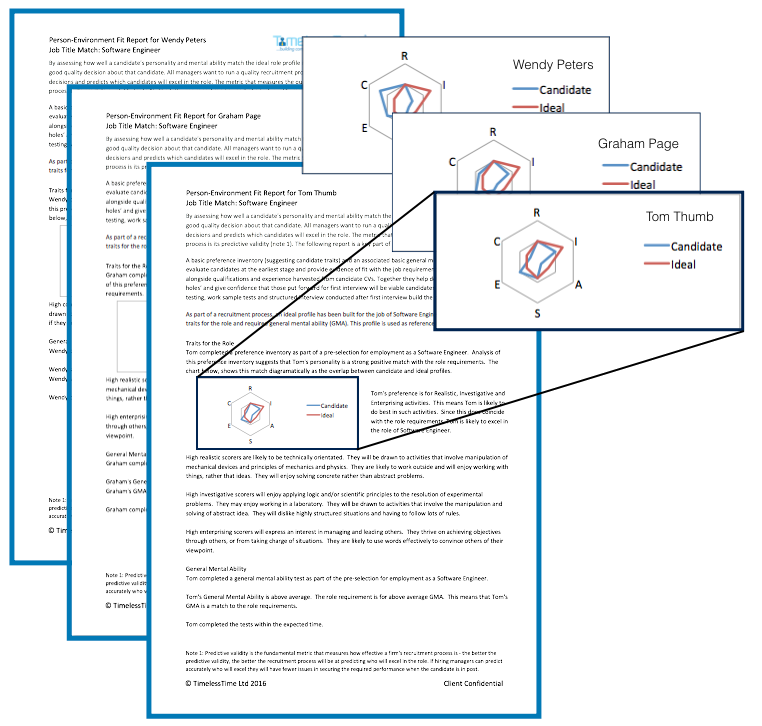So you think you can interview?
So you think you can interview?
Written by John Berry on 12th March 2018. Revised 31st October 2023.
6 min read
 Most managers think they can interview. Many even believe that they are good at it. And yet precious few have been trained and fewer still understand the true role of interviewing in ensuring fairness and valid assessment.
Most managers think they can interview. Many even believe that they are good at it. And yet precious few have been trained and fewer still understand the true role of interviewing in ensuring fairness and valid assessment.
The environment is simple enough. Given a number of candidates for a job, the manager must select one to whom they'll make an offer.
Fairness demands that the decision that the manager makes must be based only on the candidates' relative abilities. Fairness is a legal requirement. It also makes complete business sense. Managers generally, are becoming more educated about the dangers of bias and there's much been written on the business benefits of diversity. After all, who would want to make a hiring decision based on who they like or who their 'gut' suggests will perform.
Validity's a more complex concept. All managers would want to make as good a decision as possible. A 'good' decision is one where there's a link between the evidence from the selection tools used and the performance of a candidate once they're in the job.
Predicting who'll do well
So, the interview must optimally predict which of the candidates will excel. Predictive validity is the quality measure of individual selection tools like interviews. Optimal prediction is achieved by designing an interview with high predictive validity.
In high quality selection processes, the interview is just one of several selection tools which, when used together, yield the absolute maximum validity that science can provide.
There are in essence two types of interview. The first is the structured interview.
The key facet of the structured interview is that it is pre-scored and makes use of criteria developed beforehand from the key attributes sought in the candidates. Structured interviews are designed for the job in hand, so there are no boilerplate questions - you won't find structured interview questions on the Web. There's no "Tell me what you'd like to be doing in five years' time" or "Tell me the accomplishment about which you are most proud". Such generic questions don't tell the interviewer anything about how the candidate will perform in the job. They don't contribute to predictive validity.
Building a structured interview
Interview questions in a structured interview flow from the competencies and behaviours that will enable performance.
In building the job from accountabilities to necessary competencies and behaviours, the hiring manager will learn that they need a person with particular attributes. They may, for example, need someone who thinks in a structured fashion. Structured thinking would, in this case, be one of many criteria. In a structured interview the manager would build a question that, if answered particularly well, would show a candidate's competency in structured thinking. A good answer, illustrating high structured thinking would score highly. The opposite, chaotic thinking, would score low.
Supporting tools
A structured interview would support the other selection tools to cover off all the decision criteria.
 Those other tools, like testing of general mental ability and personality, evaluate criteria that are difficult to determine by talking to someone. They cover specific attributes that are difficult to assess in the structured interview, like abstract reasoning (essential for creativity) and extroversion (essential for roles with high people contact). Likewise, work sample tests cover task-related competencies. Again task-related competencies can't be assessed by talking to the candidate. Assessing keyboard skills needs a keyboard skills test.
Those other tools, like testing of general mental ability and personality, evaluate criteria that are difficult to determine by talking to someone. They cover specific attributes that are difficult to assess in the structured interview, like abstract reasoning (essential for creativity) and extroversion (essential for roles with high people contact). Likewise, work sample tests cover task-related competencies. Again task-related competencies can't be assessed by talking to the candidate. Assessing keyboard skills needs a keyboard skills test.
The structured interview does however work to corroborate evidence from the other tests.
There are specific methods used to develop the content of a structured interview and to ensure that the structured interview works with other tests.
When using structured interviews, there is no need to discuss candidates after the interviews - interviewers rely on the scoring system to make decisions. Discussion is only needed in the case of a tie and perhaps to ensure all interviewers are happy with the final decision. By relying on an objective scoring system, structured interviews are a key tool in ensuring fairness. Structured interviews and their scoring mechanisms ensure that the interview focusses only on the candidates' ability to do the job.
The unstructured interview
The second interview type is the unstructured interview.
Most hiring managers conduct unstructured, or perhaps semi-structured, interviews. In preparing for their interviews, the hiring manager typically writes down a number of questions that they'd like to ask. The hiring manager and his or her colleagues then ask each candidate the questions to kick off discussions. These managers then sense from their experience who engaged with the panel and answered the questions well. After all candidates have been seen, they discuss the various candidates and their answers.
Whether the unstructured interview has any great fairness and validity depends on the managers' experience. If each manager has interviewed thousands of candidates and they've thought about the reasons for candidate success or failure, there's a chance that the questions they ask will be valid. And if the managers are very aware of the need for fairness, it's possible that they'll be able to banish bias and consider all candidates equitably. But these are only chances. Few managers succeed in this.
Putting validity in context
This low utility of the unstructured interview is borne out in quantitative assessments of predictive validity of the two interview types. Researchers from various universities have, over the past 30 years or so, measured the predictive validity of unstructured interviews at between 0.1 and 0.38 while structured interviews score about 0.5.
Those are figures of merit on a range 0 to 1. To put them in context, structured interviews, at 0.5, are about as good as selection instruments get. The unstructured interview, at an average of around 0.25, is not terrible good as a predictive tool. There are various other tools that are worse, like handwriting tests (0.02) and the seeking of references for the candidates (around 0.2). It's just that there's better to be had.
But managers might proclaim that they're managing fine with the unstructured interview. That's generally just not true. Most managers make hiring mistakes, hiring people they later had to dismiss or hiring people they tolerate but wish they'd never hired. Most managers would like to improve the predictive capability of the tools they use. And it's just a question of knowing how.
Improving interview quality
So how should a hiring manager proceed?
Simply, structured interviews win. But they must be built vacancy by vacancy. And the interviewing managers must learn how to use and score the structured interview plan. That interview plan in turn must be developed from the accountabilities of the job and the desired competencies and behaviours.
If you'd like to discuss how to improve the predictive ability of your hiring process and tools, call us. Meanwhile, here's what we've done to improve the hiring process and tools at Assurity Consulting.